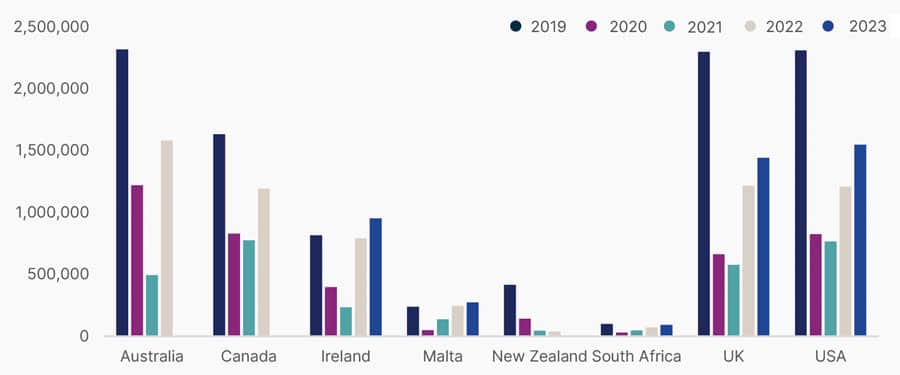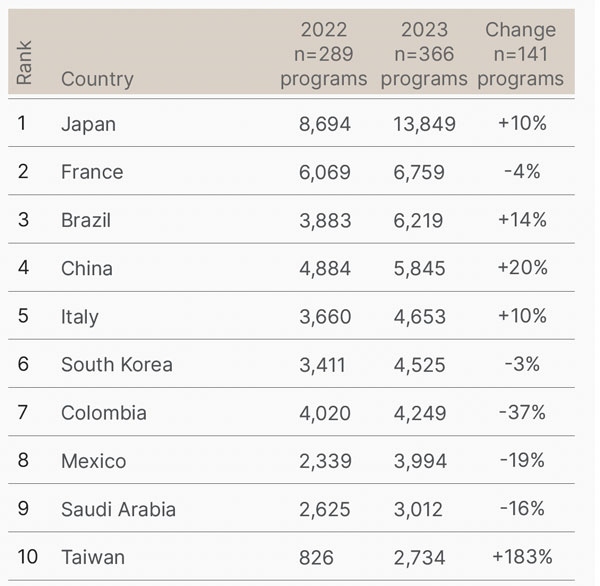US ELT providers flag visa denials as key area of concern
- The US English Language Teaching sector recovered to 69% of pre-pandemic volumes in 2023, lagging behind the recovery rate for the sector globally of 77% last year
- One factor appears to be the persistently high visa rejection rates for students applying to study English in the United States – an issue highlighted by ELT providers as the most pressing challenge facing the sector last year
The just-released 2024 Annual Report on English Language Programs in the USA expands on survey findings released earlier in the year to provide some additional detail on how the English-language teaching (ELT) sector in the US continued its post-pandemic recovery in 2023. The report, produced by industry research specialists BONARD for peak body EnglishUSA, gathers survey responses from 366 responding centres, representing nearly half (44%) of the 827 active ELT centres in the US last year.
It finds that those ELT centres collectively enrolled 97,813 language learners in 2023 for a total of 1,042,485 student weeks. This works out to roughly 69% of pre-pandemic volumes, in terms of student numbers, and it means that the US continues to lag the recovery of the sector globally. More broadly, ELT enrolments were equivalent to 77% of 2019 levels in the top eight English-language learning destinations last year.
Those 2023 figures put the US as the third leading ELT study destination, after the UK and Australia, and with a 13% global market share.

The majority of English-language learners in the US were adult students in 2023 (81%) but the junior segment (19% of enrolments) registered notable growth during the year. "Between 2022 and 2023, the junior segment experienced a 55% increase in student numbers (based on a like-to-like comparison), while the number of adult students decreased by 6%," explains the report. "The increase in the number of junior students is linked to two major factors. One is pent-up demand post-pandemic: in 2023, junior students were returning to study abroad in greater numbers compared to 2022. The second factor is a global trend observed in most source countries: more junior students are traveling abroad than ever before."
As we see in the following chart, the most popular course type for ELT students in the US last year was "General/Intensive English," followed by "Short-term summer and winter" courses and "English for Academic Purposes."

Where are students coming from?
Nearly four in ten ELT students in the US come from Asia (38%), with another 25% arriving from European countries and 20% from South American markets. The top ten sending markets for US ELT are outlined in the table below, which highlights as well that five of the ten recorded strong growth in 2023.

Visa denials identified as a major challenge
Most ELT students in the US in 2023 (54%) were F-1 visa holders. Another 19% had ESTAs and 8% B-1/B-2 visas. Visa rejection rates remain a key area of concern for the sector, with nearly two-thirds (64%) of responding centres citing student visa denials as the most significant challenge for US ELT providers in 2023.
The report notes: "Visa refusals are one of the most pressing challenges in the US international education sector. In 2023, the US Department of State rejected 36% of F-1 student visas, representing 253,355 students. Responding ELPs reported an average 24% visa refusal rate in 2023. India recorded the highest number of visa refusals with 1,181 students. Brazil followed with 994 students, and Türkiye came third, with 862."
“Student visa denials are likely to have played a part in slowing down post-pandemic growth in the sector,” adds Dr Ivana Bartosik, BONARD’s international education director. “Several key source markets, such as Brazil, Türkiye, and Colombia, did not reach their growth potential because of visa denials.”
When asked what would help mitigate visa refusal rates, respondents to the EnglishUSA server call especially for greater transparency in visa processing and additional supports for applicants.
More specifically, responding centres highlighted the need for:
- More and better information about visa refusals, including detailed explanations for denials so that future applicants can be better advised and prepared.
- Additional documentation and video briefings for applicants to help them better understand the visa application process, and to ensure that all steps are properly and thoroughly completed.
- Targeted supports for applicants to assist with visa interview preparation, including advance Zoom calls or orientation videos offering tips for successful interviews.
- Improved visa processing times, including reduced wait times for applicant interviews.
- Additional sector advocacy for ELT study as a valid reason for a visa application. "It is important to recognize ELT as a legitimate pathway to higher education and cultural immersion in the USA," adds the report. "Initiatives such as awareness campaigns, workshops, and advocacy for incoming F-1 approvals for ELPs could mitigate visa denials based on misconceptions about the purpose and validity of language study."
Commenting on this aspect of the survey findings, EnglishUSA President Daryl Bish again stressed the need for better data and insights around visa rejections, "Survey participants called for better communication and increased transparency around visa denials. Understanding the specific reasons why visas are rejected can help programs provide better support for students and address shortcomings in future applications.”
The report highlights as well the significant financial impact of poor visa services for ELT students with its estimate that the total direct economic contribution of the sector for 2023 surpassed US$1.7 billion.
For additional background, please see:
















